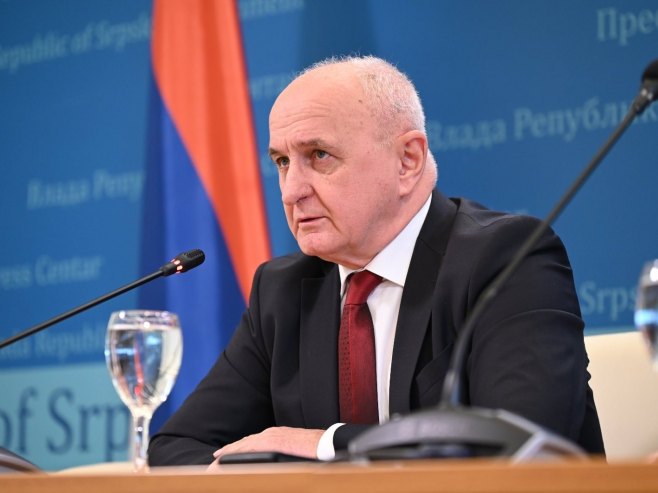You have probably heard a million times that the Dayton Peace Agreement is not a “smorgasbord,” writes lawyer Ognjen Tadić in a column for banjaluka.net.
We present the column in its entirety:
The cunning deception used as a metaphor to describe Republika Srpska as an unreliable party that cherry-picks parts of the peace agreement that suit it while discarding those it allegedly agreed to, is designed to permanently hinder serious dialogue on the functioning of Bosnia and Herzegovina and to keep the policy of “divide and rule” alive. This deception aligns more or less with a few theses from Foucault’s famous lecture on the order of discourse, as it imposes a priori the view that Republika Srpska is not a credible interlocutor because it is not a consistent and sincere adherent to the Dayton Peace Agreement, despite being a signatory to all annexes of the agreement and granting full powers to Slobodan Milošević as the representative of the Federal Republic of Yugoslavia (not as the President of the Republic of Serbia, even though he was President of Serbia at the time, not the FRY!) to sign the main text of the agreement on behalf of Republika Srpska. This suggests that anything Republika Srpska does or says regarding the Dayton Peace Agreement should be deemed insignificant and considered wrong, illegal, and non-binding for the other party or international representatives.
The never-argued slander of the “smorgasbord” is most easily debunked on the issue of so-called state property. In light of one of the recent decisions of the Constitutional Court of Republika Srpska, it is simple, and even useful for a healthy dialogue on the Dayton Peace Agreement in Bosnia and Herzegovina, to prove the absurdity and harmfulness of this slander, which is dangerous to peace and directly aimed against one of the local metaphorical phrases – “peaceful Bosnia.”
Decisions “by the letter” of two constitutions
On June 26, 2024, the Constitutional Court of Republika Srpska decided not to accept the initiative to assess the constitutionality of Article 1 of the Law on Property Rights. The initiative claimed that “the legal regulation of state property is within the jurisdiction of the institutions of Bosnia and Herzegovina,” and therefore, “according to the initiator, it is not within the competence of the legislative authorities of Republika Srpska to regulate disputed legal relations by the Law on Property Rights.” Assessing that Republika Srpska regulates and ensures “property and obligation relations and the protection of all forms of property” (Article 68, point 6 of the Constitution of Republika Srpska), and that “physical and legal persons exercise property rights on real estate according to their nature and purpose, in accordance with the law” (Article 60, paragraph 1 of the Constitution of Republika Srpska), the Constitutional Court of Republika Srpska correctly concluded that the mentioned initiative is unacceptable. In explaining its decision, the Constitutional Court of Republika Srpska also reminded of an earlier decision of the Constitutional Court of Bosnia and Herzegovina from 2000 (U-5/98). In that decision, the Constitutional Court of Bosnia and Herzegovina, resolving a request in which Alija Izetbegović sought to challenge the jurisdiction of Republika Srpska to pass property laws, stated clearly and unequivocally: “Regarding the disputed provision of Article 68, point 6 of the Constitution of Republika Srpska, the Constitutional Court finds that this provision grants Republika Srpska the authority to regulate, among other things, property and obligation relations and the protection of all forms of property, market, and planning,” and concludes: “Article 68, point 6 falls within the constitutional division of competencies between the institutions of Bosnia and Herzegovina and the entities, and is in accordance with the Constitution of Bosnia and Herzegovina.”
Therefore, when constitutional courts decide “by the letter” of the constitution, whether it is of Republika Srpska or Bosnia and Herzegovina, everything is clear and unequivocal.
Decisions “by the spirit” of unconstitutional interests
To answer the posed question, considering all the earlier presented indisputable legal arguments, we need to recall one dissenting opinion. Namely, in 2000, regarding the assessment that Article 68, point 6 of the Constitution of Republika Srpska is not contrary to the Constitution of Bosnia and Herzegovina, Judge Hans Danelius expressed a dissenting opinion, which is partly in disagreement and partly in agreement with the Court’s decision. Danelius demands a framework legislation at the state level of Bosnia and Herzegovina to specify the standards necessary to fulfill the constitutional obligations related to property and that such framework legislation of Bosnia and Herzegovina should determine various forms of property, the holders of those rights, and the general principles for their exercise in terms of property law, which usually represents an element of civil law codes in democratic states. Danelius also claims that “Article III of the Constitution of Bosnia and Herzegovina does not provide for an exclusive distribution of competencies between the institutions of Bosnia and Herzegovina and the entities but requires that the implied powers of both the institutions of Bosnia and Herzegovina and the entities be taken into account due to the necessary cooperation within a single state.” However, the decision made by the Court was contrary to Danelius’s views. All the arguments he presented were rejected by the Constitutional Court of Bosnia and Herzegovina as unfounded. How then, and especially why, were they revived in later decisions of the Constitutional Court of Bosnia and Herzegovina (U-1/11, etc.), which unconstitutionally created the greatest post-war crisis in the application of not only the Constitution but also the Dayton Peace Agreement?
Counting hands instead of protecting the Constitution of Bosnia and Herzegovina
As a Bosniak member of the Presidency of Bosnia and Herzegovina, Alija Izetbegović, in 1998, by submitting a request to assess the constitutionality of numerous provisions of the Constitution of Republika Srpska, showed that he intended to attack the new Dayton arrangement of Bosnia and Herzegovina, especially the arrangement of the entities. The arrangement he personally signed. Aware that by abolishing the Constitution of the Republic of Bosnia and Herzegovina from 1993 (Article 12 of the Constitution of Bosnia and Herzegovina), Bosnia and Herzegovina lost the competence to pass property laws and that this competence was assigned to the entities (Article 3 of the Constitution of Bosnia and Herzegovina), he tried, in the style of a “smorgasbord,” to use the fact that the Constitutional Court of Bosnia and Herzegovina makes decisions by a simple majority, which does not have to include judges from Republika Srpska, to de facto repackage the constitutional distribution of competencies between Bosnia and Herzegovina and the entities. Although he managed to count the judges in his favor in several other provisions of the Constitution of Republika Srpska, the plan failed on the issue of jurisdiction for enacting property laws, as the then composition of the court was aware that they had no basis to support Izetbegović’s request and did not show the audacity they displayed in overthrowing other constitutional provisions of Republika Srpska. It is worth noting that the Decision U-5/98 states that “the Constitutional Court, unanimously, made a decision regarding Article 59, paragraphs 4 and 5, and Article 60 of the Constitution of RS,” and that “the decision for Article 68, point 6 was made with six votes in favor and one against.” It is particularly important to highlight that the Constitutional Court of Bosnia and Herzegovina made the decision with a composition that included “the president of the Court, Prof. Dr. Kasim Begić, judges Dr. Hans Danelius, Prof. Dr. Louis Favoreu, Prof. Dr. Joseph Marko, Dr. Zvonko Miljko, Azra Omeragić, and Mirko Zovko.” It is immediately apparent that there are neither Serbs nor judges from Republika Srpska among them. Therefore, two foreign judges and four judges from the Federation of Bosnia and Herzegovina (two Bosniaks and two Croats), decided in 2000 on the constitutionality of Republika Srpska’s jurisdiction to pass property laws, which Alija Izetbegović sought to be taken away from it, and determined that this jurisdiction of Republika Srpska was constitutional and indisputable from the standpoint of the Constitution of Bosnia and Herzegovina!
Eleven years later, in 2011, the Constitutional Court of Bosnia and Herzegovina, in a new composition, with new foreigners and one former acting president of the SDA and one former vice-president of the SDA, revived Danelius’s dissenting opinion upon the request of the then-president of the SDA, Sulejman Tihić, and turned it into a new stance of the Constitutional Court of Bosnia and Herzegovina. This has consumed thirteen years of our lives and ruined Bosnia and Herzegovina’s path to the EU (and even NATO while there was a general agreement on the matter). In a renewed attempt to use the Dayton Peace Agreement as a “smorgasbord,” Bosniak officials unconstitutionally and disrespectfully disregarded the Constitution of Bosnia and Herzegovina, which they are obliged to protect, misused the decision-making method in the Constitutional Court of Bosnia and Herzegovina, and thereby unconstitutionally attacked the entities’ jurisdictions – successfully in terms of hindering jurisdiction and unsuccessfully regarding the ultimate goal of creating a new jurisdiction for Bosnia and Herzegovina.
The power of the constitution
Interventions by the High Representatives for Bosnia and Herzegovina do not constitute usable
documents for resolving property-related issues in a way that would differ from the constitutional structure and division of competencies established by the 1995 Constitution of Bosnia and Herzegovina. Neither Annex 10 of the Dayton Peace Agreement nor the so-called Bonn Powers grants them the authority to pass laws. This fact is persistently ignored by some domestic actors, leading to numerous anti-Dayton decisions being imposed on us. However, when it comes to property and its further disposal, the practice of using decisions of the High Representatives is problematic for foreigners. Property requires more lasting legal security, which cannot be achieved through the decisions of the High Representatives. Not only would property acquired by a foreigner through unconstitutional means previously transferred to Bosnia and Herzegovina be challenged by any significant political change, but in the eyes of potential business partners or banks (who would certainly not treat it as creditworthy), such property would never enjoy legal security and would not be interesting for regular legal transactions and lawful economic activity. Therefore, there is pressure (sanctions, etc.) for domestic institutions to sanction the wishes and interests of foreigners and pass a law that would enable this.
It is clear that the role of the Constitutional Court of Bosnia and Herzegovina has been and remains “to create confusion between the constitutional competencies of the institutions of Bosnia and Herzegovina and the entities, on one hand, and the question of who has the right to certain property, on the other hand, and to use this created confusion to make decisions that nullify the laws of Republika Srpska.” This long-term hinders Republika Srpska in exercising its constitutional competencies and economically exhausts it. The decision of the majority of judges in the Constitutional Court of Bosnia and Herzegovina to continue undermining the Constitution of Bosnia and Herzegovina and the entities’ constitutions in this way, i.e., to openly attack the constitutional order they are supposed to protect, is an evident crime that will sooner or later be overcome and punished, or Bosnia and Herzegovina will suffer until exhaustion because of it. In contrast, the decision of the Constitutional Court of Republika Srpska, which is also entirely in agreement with the decision of the Constitutional Court of Bosnia and Herzegovina U-5/98 from 2000, to withstand pressures and once again step in favor of protecting constitutionality in Bosnia and Herzegovina and Republika Srpska, confirms the power of our constitutions and the importance of all of us giving them the necessary respect. Not just on this issue, because our constitutions are indeed not a “smorgasbord,” and without them, there truly is no “peaceful Bosnia.” This is neither a metaphor nor a metaphorical phrase in our case but clearly stated facts.
Source: RTRS









